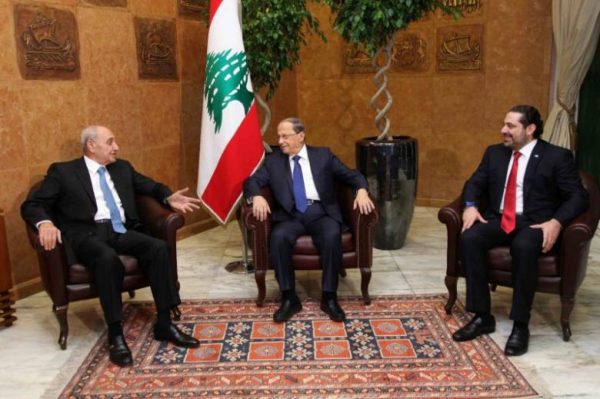
The Lebanese Cabinet approved on Saturday its draft policy statement that calls for “restoration of trust.”
Speaker Nabih Berri called for a parliament meeting on Tuesday to approve the policy statement and to grant the government the vote of confidence
Both President Michel Aoun and Prime Minister Saad Hariri attended the session held at the Baabda Presidential Palace.
“The government abides by the Inauguration speech… and distances Lebanon from external conflicts,” the ministerial statement read.
The term “restoration of trust ” reassures everybody, both in Lebanon and abroad, of their strong diplomatic relations with Arab states and the international community, Riachi quoted Aoun as saying.
Relations with GCC countries have deteriorated, particularly with Saudi Arabia, following Hezbollah’s involvement in regional wars.
The statement also emphasized that the government is seeking to liberate occupied land, citing the right of Lebanese citizens to resistance against the Israeli threat.
Lebanese Forces Ministers, however, had “reservations regarding the right of the Lebanese citizens to resistance…It is an exclusive entitlement to the Lebanese government,” LF Minister Melhem Riachi said as he announced the agreement on the policy statement..
According to LF, it would have been much better to replace the clause that read the “right of the people for resistance”, with the “right of the Lebanese State for resistance”, ostensibly to bring everyone under the authority of the state.
Following the grating of the vote of confidence The Cabinet will focus on the approval of an electoral law and the necessary measures to ensure that elections are held as scheduled, President Aoun said during the session.
Political parties have conflicting demands over the electoral law to be implemented during the coming 2017 elections.
Several parties have proposed a hybrid law blending winner-takes-all and proportional voting.
Future, Progressive Socialist Party, LF and Amal Movement have proposed separate hybrid formulas with electoral constituencies of differing sizes.
Hezbollah and FPM have been lobbying for a proportional law with Lebanon as a single constituency.
However, FPM chief Gebran Bassil Thursday lashed out at the proposed laws that lacked uniformed standards of dividing electoral constituencies.
He asked for the adoption of a sectarian-based 2011 law known as the Orthodox Gathering Law.
It was initially presented by the March 8 alliance and the March 14 Christian parties.
MP Elie Firzli, who drafted the law, Sunday denounced claims that it had aggravated sectarian tensions.
“Orthodox Law is not sectarian; it ensures the proper representation of all Lebanese, especially Christians,” Firzli said in a talk show on MTV.
Hezbollah and FPM firmly reject the return to the 1960 electoral system.
Parliamentary elections are set to take place in May 2017. The last elections took place in 2009 Parliament extended its own mandate twice, citing security concerns.

Leave a Reply
You must be logged in to post a comment.